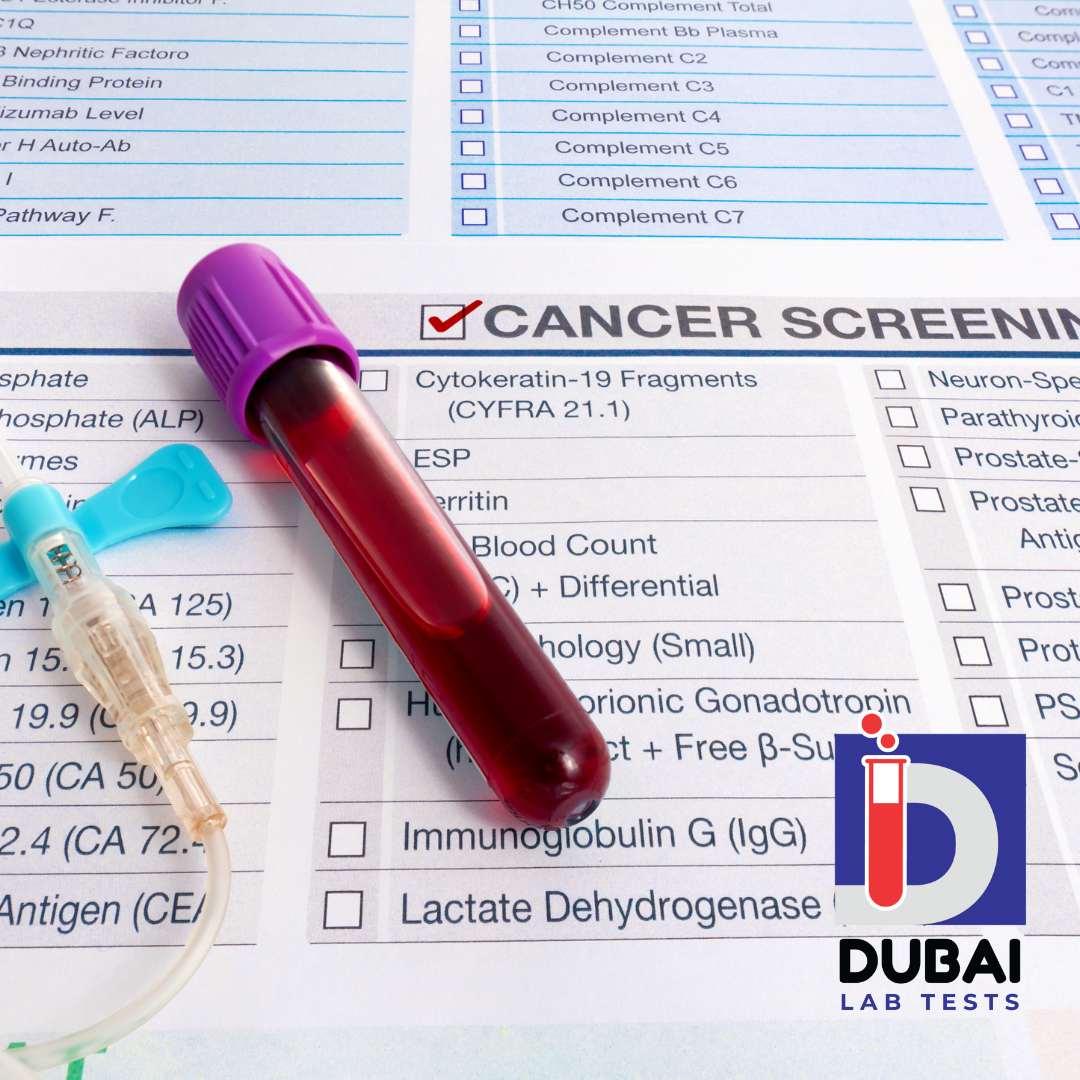Cancer Marker – Male
د.إ650.00
Includes the following parameters:
- Alpha-Fetoprotein (AFP)
- CA 19.9, Serum (Pancreatic Cancer Marker)
- Carcinoembryonic Antigen (CEA), Serum
- Prostate-Specific Antigen (PSA), Total Serum
- Prostate-Specific Antigen (PSA), Free Serum
- Human Chorionic Gonadotropin (HCG)
Description
Male Cancer Marker Panel – Comprehensive Blood Test for Early Cancer Detection
Why You Need This Test
The Male Cancer Marker Panel is a specialized diagnostic test designed to detect key tumor markers associated with various types of cancers affecting men. This test plays a crucial role in early cancer detection, monitoring treatment response, and assessing the risk of cancer recurrence.
By measuring specific cancer-related proteins and antigens in the blood, this panel helps detect prostate, pancreatic, testicular, liver, and gastrointestinal cancers at an early stage, when treatment is most effective. It is recommended for men with a family history of cancer, high-risk individuals, or those experiencing unexplained symptoms related to malignancies.
This comprehensive cancer marker panel includes:
- Alpha-Fetoprotein (AFP) – A key marker for liver and testicular cancer
- CA 19.9 (Pancreatic Cancer Marker) – Used for detecting and monitoring pancreatic cancer
- Carcinoembryonic Antigen (CEA) – Assesses the risk of colorectal, lung, and other gastrointestinal cancers
- Prostate-Specific Antigen (PSA), Total & Free – Crucial for prostate cancer screening and differentiation between benign and malignant prostate conditions
- Human Chorionic Gonadotropin (HCG) – A tumor marker for testicular cancer and certain other malignancies
Symptoms That Indicate This Test
This Male Cancer Marker Panel is recommended if you experience:
- Unexplained weight loss
- Persistent fatigue or weakness
- Abdominal pain or bloating (potential liver, pancreatic, or gastrointestinal cancer signs)
- Changes in bowel habits, such as constipation or diarrhea
- Blood in stool or urine
- Persistent cough or difficulty swallowing
- Lump or swelling in the testicles (may indicate testicular cancer)
- Frequent urination, weak urine flow, or difficulty urinating (possible prostate issues)
- Chronic back pain or pelvic discomfort
If you have a family history of cancer, particularly prostate, pancreatic, colorectal, or liver cancer, regular screening through this test is essential for early detection and prevention.
How the Body Produces These Markers
Cancer markers are proteins or substances produced by tumor cells or by the body in response to cancer. While some of these markers can be elevated due to benign conditions, persistently high levels may indicate the presence of malignancies.
- AFP is naturally produced by the liver, but its elevated levels in adults may signal liver cancer or germ cell tumors.
- CA 19.9 is associated with pancreatic and gastrointestinal cancer and is produced by abnormal cell growth in these regions.
- CEA is a protein found in fetal development but is usually low in healthy adults. Elevated levels may suggest colorectal, lung, or gastrointestinal cancers.
- PSA is produced by the prostate gland, and while low levels are normal, an increased PSA may indicate prostate cancer or benign prostatic hyperplasia (BPH).
- HCG is a hormone typically associated with pregnancy, but its presence in men can indicate testicular or other rare cancers.
Regular monitoring of these markers can aid in early diagnosis, tracking disease progression, and evaluating the effectiveness of treatment.
What Happens If Cancer Markers Are Elevated and Left Unchecked?
Elevated cancer markers may indicate an increased risk of malignancy, which, if undetected or ignored, can lead to:
- Advanced-stage cancer, reducing treatment options and survival rates
- Metastasis, where cancer spreads to other organs
- Delayed treatment, leading to severe complications
- Increased health risks, including organ dysfunction and compromised immune response
Early detection through this Male Cancer Marker Panel allows for timely medical evaluation, lifestyle adjustments, and improved prognosis.
How to Prepare for the Test
To ensure accurate results, follow these preparation guidelines:
- Fasting is not required unless specified by your doctor
- Avoid alcohol and heavy meals the night before the test, as they may affect liver-related markers
- Inform your doctor about any medications, particularly those for prostate health, liver conditions, or hormone therapy
- For PSA testing, avoid ejaculation and vigorous exercise 24-48 hours before the test, as these can temporarily raise PSA levels
The Male Cancer Marker Panel is a vital screening tool for men’s health, cancer prevention, and early diagnosis. Whether used for routine monitoring, high-risk assessments, or treatment evaluation, this test provides critical insights into cancer detection and overall well-being.






Reviews
There are no reviews yet.